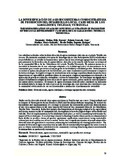Mostrar el registro sencillo del ítem
La diversificación de agroecosistemas como estrategia de promoción del desarrollo local. Caso Mesa de los Gabaldones, Trujillo, Venezuela
| dc.rights.license | http://creativecommons.org/licenses/by-nc-sa/3.0/ve/ | es_VE |
| dc.contributor.author | Fernández-Molina, Félix Ramón | |
| dc.contributor.author | Daboin Conrado, Luís | |
| dc.contributor.author | Medina, María Gabriela | |
| dc.contributor.author | Tirado-Delfín, Eugenio Enrique | |
| dc.date.accessioned | 2019-12-02T13:48:51Z | |
| dc.date.available | 2019-12-02T13:48:51Z | |
| dc.date.issued | 2019-12-02 | |
| dc.identifier.uri | http://www.saber.ula.ve/handle/123456789/46335 | |
| dc.description.abstract | Los estudios realizados sobre la diversificación de agroecosistemas citrícolas en el estado Trujillo son escasos. Recurriendo a métodos y técnicas de Investigación Acción Participativa (IAP) y al muestreo no probabilístico, se estudió la formulación y aplicación de una estrategia agroproductiva sostenible para promover la diversificación de monocultivos citrícolas en la zona de vida bosque seco tropical de la comunidad Mesa de los Gabaldones del estado Trujillo-Venezuela. En primera instancia se incentivó la formulación de una estrategia adaptada a la realidad agrícola y socioeconómica de la comunidad, procurando que tuviera el mayor grado de factibilidad y viabilidad posible. Posteriormente se realizó su aplicación por parte de los habitantes, así como el monitoreo para determinar el impacto de dicha estrategia. Se registró el logro de una trasferencia tecnológica oportuna donde los productores demostraron su capacidad de producir rubros de una mayor exigencia agronómica recurriendo a la aplicación de prácticas culturales sostenibles y al uso de bioinsumos. De esta forma un significativo número de habitantes adoptó la diversificación de agroecosistemas, potenciando la sostenibilidad de los monocultivos existentes. El número de agroecosistemas diversificados constituyó un indicador de sostenibilidad a lo largo de todo el proceso de investigación cuya intervención contribuyó a que la comunidad evolucionara de ser casi insostenible a intermedio o medianamente sostenible. | es_VE |
| dc.language.iso | es | es_VE |
| dc.publisher | SaberULA | es_VE |
| dc.rights | info:eu-repo/semantics/openAccess | es_VE |
| dc.subject | Diversificación | es_VE |
| dc.subject | Agroecosistemas | es_VE |
| dc.subject | Estrategia agroproductiva sostenible | es_VE |
| dc.title | La diversificación de agroecosistemas como estrategia de promoción del desarrollo local. Caso Mesa de los Gabaldones, Trujillo, Venezuela | es_VE |
| dc.title.alternative | The diversification of agrasystems as strategy of promotion of the local develpment. Case Mesa de Los Gabaldones, Trujillo, Venezuela | es_VE |
| dc.type | info:eu-repo/semantics/article | es_VE |
| dcterms.dateAccepted | 27/02/2019 | |
| dcterms.dateSubmitted | 19/10/2017 | |
| dc.description.abstract1 | Studies on the diversification of citrus agroecosystems in Trujillo state are scarce. Using methods and techniques of Participative Action Research (PAR) and the non-probability sampling, we studied the formulation and implementation of a strategy to promote the sustainable production diversification of our citrus monocultures in life zone tropical dry forest of the community Mesa de los Gabaldones Trujillo State-Venezuela. In the first instance the formulation of strategies adapted to the agricultural and socioeconomic reality of community led, chasing them to have the highest degree of feasibility and viability. Then its implementation by the inhabitants took place, as well as monitoring to determine the impact of these strategies. It is achieving a timely technology transfer where producers demonstrated their ability to produce items of greater agronomic application requirement using sustainable cultural practices and the use of bio-recorded. In this way a signifi cant number of people adopted the diversification of agricultural ecosystems, enhancing the sustainability of existing monocultures. The number of diversified agroecosystems was an indicator of sustainability throughout the entire research process whose intervention contributed to the community evolving from being almost unsustainable to intermediate or moderately sustainable. | es_VE |
| dc.description.colacion | 79-93 | es_VE |
| dc.description.email | felixfer@ula.ve | es_VE |
| dc.description.email | magameri@gmail.com | es_VE |
| dc.description.email | eutir@ula.ve | es_VE |
| dc.description.paginaweb | http://www.saber.ula.ve/academia/ | |
| dc.identifier.depositolegal | pp 200202 TRI 298 | |
| dc.identifier.eissn | 2244 - 842X | |
| dc.publisher.pais | Venezuela | es_VE |
| dc.subject.Mots-cles | Diversification | es_VE |
| dc.subject.institucion | Universidad de Los Andes | es_VE |
| dc.subject.keywords | Agroecosystems | es_VE |
| dc.subject.keywords | Sustainable agro-productive strategy | es_VE |
| dc.subject.seccion | Revista Academia: Artículos | es_VE |
| dc.subject.tipo | Artículos | es_VE |
| dc.type.media | Texto | es_VE |
Ficheros en el ítem
Este ítem aparece en la(s) siguiente(s) colección(ones)
-
Academia - Año 18 - Nº 42
Julio- Diciembre 2019


